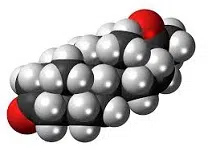In order to know the meaning of the term hormone, it is necessary, first of all, to discover its etymological origin. In this case, we have to state that it is a neologism that was shaped by the English physiologist Ernest Henry Starling (1866 – 1927). To create it, what he did was to base it on a word of Greek origin: "hormon", which is synonymous with "excited" and which derives from the verb "horman", which is synonymous with "excite".
A hormone is the substance secreted by certain glands that promotes, blocks or regulates the activity of the organs . Hormones reach different parts of the body through the circulatory system .
 Growth, metabolism, mood and sexual functioning are some of the processes influenced by hormones, which reach the various tissues through the bloodstream . A small change in the normal amount of hormones can cause a major imbalance in the body .
Growth, metabolism, mood and sexual functioning are some of the processes influenced by hormones, which reach the various tissues through the bloodstream . A small change in the normal amount of hormones can cause a major imbalance in the body .
Lack or deficiency of a hormone or excess of it can be detected through laboratory tests , studying saliva, urine or blood . If a hormonal disorder is noticed, the doctor can indicate various treatments.
Glands that produce hormones, such as the thyroid , pineal gland , adrenal glands , and gonads , form the endocrine system. In any case, organs such as the brain, kidneys, lungs and liver are also responsible for the generation and release of hormones, which are part of the so-called chemical messengers .
Diabetes , Cushing's syndrome and gigantism are some of the problems related to hormonal disorders, which can have different severity depending on their characteristics.
As for the most important hormones, we can mention melatonin , adrenaline , dopamine , insulin , histamine , progesterone and testosterone , among others. It should be noted that many hormones are used in the field of medicine: insulin is used in diabetes treatments, for example, while progesterone is part of birth control pills.
In a society in which we live that is so carried away by stress and the accelerated pace of life, there is a lot of talk about what are known as happiness hormones. These are considered to be responsible for making anyone feel good.
We are referring to the following:
-Dopamine, which is associated with both love and lust.
-Endorphin, which can be activated by carrying out actions as simple as watching a movie or television series as well as eating spicy food.
-Oxytocin, which is also known as the hug hormone because what it does is that an individual can feel good and happy thanks to creating emotional bonds with another person.
-Serotonin, which is activated in a person when they feel important. To produce it, you can carry out actions as simple as practicing physical exercise, going for a bike ride outdoors, sunbathing or even receiving a massage.
